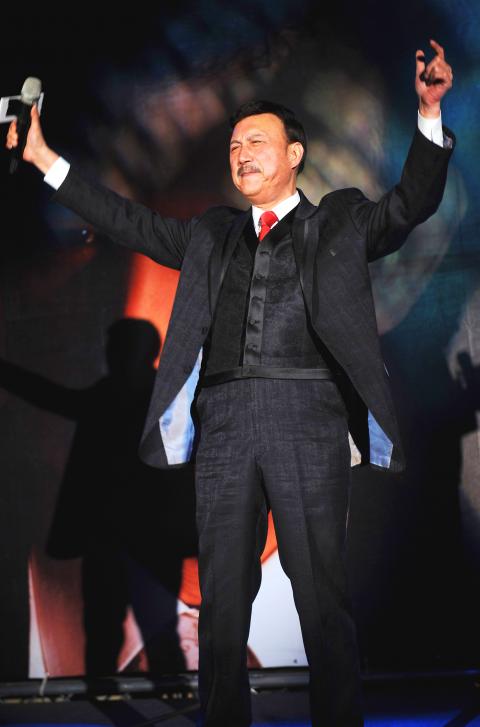Former Democratic Progressive Party (DPP) legislator Yu Tian (余天), a singer-turned--politician, on Tuesday announced his return to show business after his failed bid to secure a legislator-at-large seat in the Jan. 14 elections.
In the legislative election, the DPP garnered 13 legislator-at-large seats in the Legislative Yuan, which meant Yu was left out, as he only ranked 14th on the party’s nomination list.
Months after his unexpected loss in the election, the 65-year-old Yu, who said he had piled up a NT$20 million (US$677,000) debt over the past four years as a lawmaker, had decided to leave the political arena to relaunch his singing career.

Photo: Sung Chih-hsiung, Taipei Times
To celebrate the 48 years since he launched his music career, Yu plans to stage a live concert at Greater Kaohsiung’s K-Arena on June 30.
Yu’s return to the entertainment industry drew mixed responses.
Senior TV host He Yi-hang (賀一航) ridiculed Yu for having gone into politics in the first place, saying he was like an “old rabbit mistakenly barging into the political jungle.”
However, another popular stand-up comedian and TV host, Chu Ke Liang (豬哥亮), who has also been weighed down by massive debt, voiced support for Yu’s comeback.
“Do you know how ecstatic I was to see you lose the election?” Chu asked Yu, adding that he would make an appearance at Yu’s concert to show his support.
Yu denied that he had only decided to resume his music career to pay off his debts.
“There is no such thing as retirement for entertainers — only if audiences no longer want to see you perform,” said Lee Ya-ping (李亞萍), Yu’s wife, who is also a singer.
Saying show business is a world of cruelty, Yu added: “The political world is even crueler.”
Translated by Stacy Hsu, Staff Writer

Alain Robert, known as the "French Spider-Man," praised Alex Honnold as exceptionally well-prepared after the US climber completed a free solo ascent of Taipei 101 yesterday. Robert said Honnold's ascent of the 508m-tall skyscraper in just more than one-and-a-half hours without using safety ropes or equipment was a remarkable achievement. "This is my life," he said in an interview conducted in French, adding that he liked the feeling of being "on the edge of danger." The 63-year-old Frenchman climbed Taipei 101 using ropes in December 2004, taking about four hours to reach the top. On a one-to-10 scale of difficulty, Robert said Taipei 101

Nipah virus infection is to be officially listed as a category 5 notifiable infectious disease in Taiwan in March, while clinical treatment guidelines are being formulated, the Centers for Disease Control (CDC) said yesterday. With Nipah infections being reported in other countries and considering its relatively high fatality rate, the centers on Jan. 16 announced that it would be listed as a notifiable infectious disease to bolster the nation’s systematic early warning system and increase public awareness, the CDC said. Bangladesh reported four fatal cases last year in separate districts, with three linked to raw date palm sap consumption, CDC Epidemic Intelligence

US climber Alex Honnold left Taiwan this morning a day after completing a free-solo ascent of Taipei 101, a feat that drew cheers from onlookers and gained widespread international attention. Honnold yesterday scaled the 101-story skyscraper without a rope or safety harness. The climb — the highest urban free-solo ascent ever attempted — took just more than 90 minutes and was streamed live on Netflix. It was covered by major international news outlets including CNN, the New York Times, the Guardian and the Wall Street Journal. As Honnold prepared to leave Taiwan today, he attracted a crowd when he and his wife, Sanni,

Taiwanese and US defense groups are collaborating to introduce deployable, semi-autonomous manufacturing systems for drones and components in a boost to the nation’s supply chain resilience. Taiwan’s G-Tech Optroelectronics Corp subsidiary GTOC and the US’ Aerkomm Inc on Friday announced an agreement with fellow US-based Firestorm Lab to adopt the latter’s xCell, a technology featuring 3D printers fitted in 6.1m container units. The systems enable aerial platforms and parts to be produced in high volumes from dispersed nodes capable of rapid redeployment, to minimize the risk of enemy strikes and to meet field requirements, they said. Firestorm chief technology officer Ian Muceus said